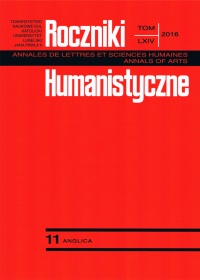Czy złożenia są procesem produktywnym w języku angielskim?
Abstract
The subject matter of this paper is English nominal compounding — the process of putting nouns together to form a new lexical item. More specifically, this paper addresses the issue that is commonly taken for granted in available accounts of compounding, i.e. the recursiveness of English endocentric nominal compounds. Corpus data indicates a great disparity between the frequencies of noun-noun compounds and multi-noun structures. Our study gives possible reasons behind the low number of occurrences of noun compounds composed of more than two words.
Corpus evidence points to the conclusion that English multi-noun compounds are typically constructed with nouns that have been previously lexicalized; such lexicalized compounds commonly function as the base for more complex noun structures; the low frequency of multi-noun compounds emerges as a result of insufficient number of lexicalized noun-noun constructs. The small number of multi-noun compounds has no effect on the overall compound productivity as the process of multi-noun compound creation in the mind of a speaker is identical with that of noun-noun compounding — compounding always consists in putting together a modifier and a head, regardless of the number of nouns within a compound. The structure of any compound is a reflection of the way it is created in the mind of a speaker.
References
Adams, Valerie. 1973. An introduction to modern English word-formation. English. Language Series 7. London: Longman.
Adams, Valerie. 2001. Complex Words in English. Harlow: Longman.
Bauer, Laurie. 1998. Vocabulary. London and New York: Routledge.
Bauer, Laurie. 2003. Introducing linguistic morphology. 2nd ed. Edinburgh: Edinburgh University Press.
Crystal, David. 1998. Language play. Harmondsworth: Penguin.
DiSciullo, Anna Maria, and Edwin Williams. 1987. On the definition of word. Cambridge, MA: The MIT Press.
Downing, Pamela. 1977. “On the creation and use of English compound nouns.” Language 53(4): 810–842.
Fabb, Nigel. 1998. “Compounding.” In The Handbook of Morphology, edited by Andrew Spencer and Arnold Zwicky, 66-83. Oxford: Blackwell Publishers Ltd.
Fletcher, William (2003-2010). Phrases in English. http://phrasesinenglish.org (accessed 12.12.2016).
Fudge, Erik. 1984. English Word-stress. London: George Allen & Unwin.
Giegerich, Heinz (2004). “Compound or Phrase? English noun-plus-noun constructions and the stress criterion.” English Language and Linguistics 8: 1–24.
Haspelmath, Martin. 2002. Understanding morphology. London: Arnold.
Jackendoff, Ray. 2009. “Compounding in the parallel architecture and conceptual semantics.” In The Oxford handbook of compounding, edited by Rochelle Lieber and Pavol Štekauer, 105–28. Oxford: Oxford University Press.
Jespersen, Otto. 1954. A modern English grammar. London: George Allen and Unwin.
Katamba, Francis. 1993. Morphology. London: Macmillan.
Kuiper, Koenraad. 1999. “Compounding by adjunction and its empirical consequences.” Language Sciences 21: 407–422.
Levi, Judith N. 1978. The syntax and semantics of complex nominals. New York: Academic Press.
Liberman, Mark, and Richard Sproat. 1992. “The Stress and Structure of Modified Noun Phrases in English.” In Lexical matters, edited by Ivan Sag and Anna Szabolcsi, 131-181. Stanford: Center for the Study of Language and Information.
Lieber, Rochelle. 2005. “English word-formation processes.” In Handbook of Word-formation, edited by Rochelle Lieber and Pavol Štekauer, 375–427. Dordrecht: Springer.
Lieber, Rochelle, and Pavol Štekauer. 2009. “Introduction: Status and definition of compounding.” In The Oxford handbook of Compounding, edited by Rochelle Lieber and Pavol Štekauer, 105–28. Oxford: Oxford University Press.
Lipka, Leonhard (1992). “Lexicalization and institutionalization in English and German.” Linguistica Pragensia 1: 1-13. Or: Piefke, Wendehals, Smog, Perestroika, AIDS etc. Zeitshrift für Anglistik und Amerikanistik, 40, 101–111.
Marchand, Hans. 1967. “Expansion, transposition, and derivation.” La Linguistique 3(1): 13–26. Reprinted in: Studies in syntax and word-formation. Selected articles by Hans Marchand, edited by Dieter Kastovsky, 322–337. München: Wilhelm Fink.
Plag, Ingo. 2003. Word-formation in English. Cambridge textbooks in linguistics. Cambridge: Cambridge University Press.
Plag, Ingo. 2006. “The variability of compound stress in English: structural, semantic and analogical factors.” English Language and Linguistics 10(1): 143–172.
Schultink, Henk. 1961. “Produktiviteit als morphologisch fenomeen.” Forum der Letteren 2: 110–125.
Schmerling, Susan F. 1971. “A stress mess.” Studies in the Linguistic Sciences 1: 52–65.
Selkirk, Elisabeth O. 1982. The syntax of words. Cambridge, MA: MIT Press.
Spencer, Andrew. 2003. “Does English have productive compounding?” In B. Gert, J. DeCesaris, A. Ralli and S. Scalise (eds.), Topics in morphology. Selected papers from the third Mediterranean morphology meeting (Barcelona, September 20-22, 2001), edited by Geert Booij, Janet DeCesaris, Angela Ralli, Sergio Scalise, 329-341. Barcelona: Institut Universitari de Lingüística Applicada, Universtitat Pompeu Fabra.
Štekauer, Pavol. (2005). Meaning predictability in word formation: Novel, context-free naming units. Amsterdam: John Benjamins.
Szymanek, Bogdan. 1998. Introduction to morphological analysis. Warszawa: PWN.
The British National Corpus. (1980s-1993). (2013). Brigham Young University. http://corpus. byu.edu/bnc (accessed 12.12.2016).
The Corpus of Contemporary American English (1990-2012). (2013). Brigham Young University. http://corpus.byu.edu/coca (accessed 12.12.2016).
Warren, Beatrice. 1978. Semantic patterns of noun–Noun compounds. Gothenburg: Gothenburg University Press.
Zwicky, Arnold. 1986. “Forestress and afterstress.” Ohio State University Working Papers in Linguistics 32, 46–62.
Copyright (c) 2016 Roczniki Humanistyczne

This work is licensed under a Creative Commons Attribution-NonCommercial-NoDerivatives 4.0 International License.





